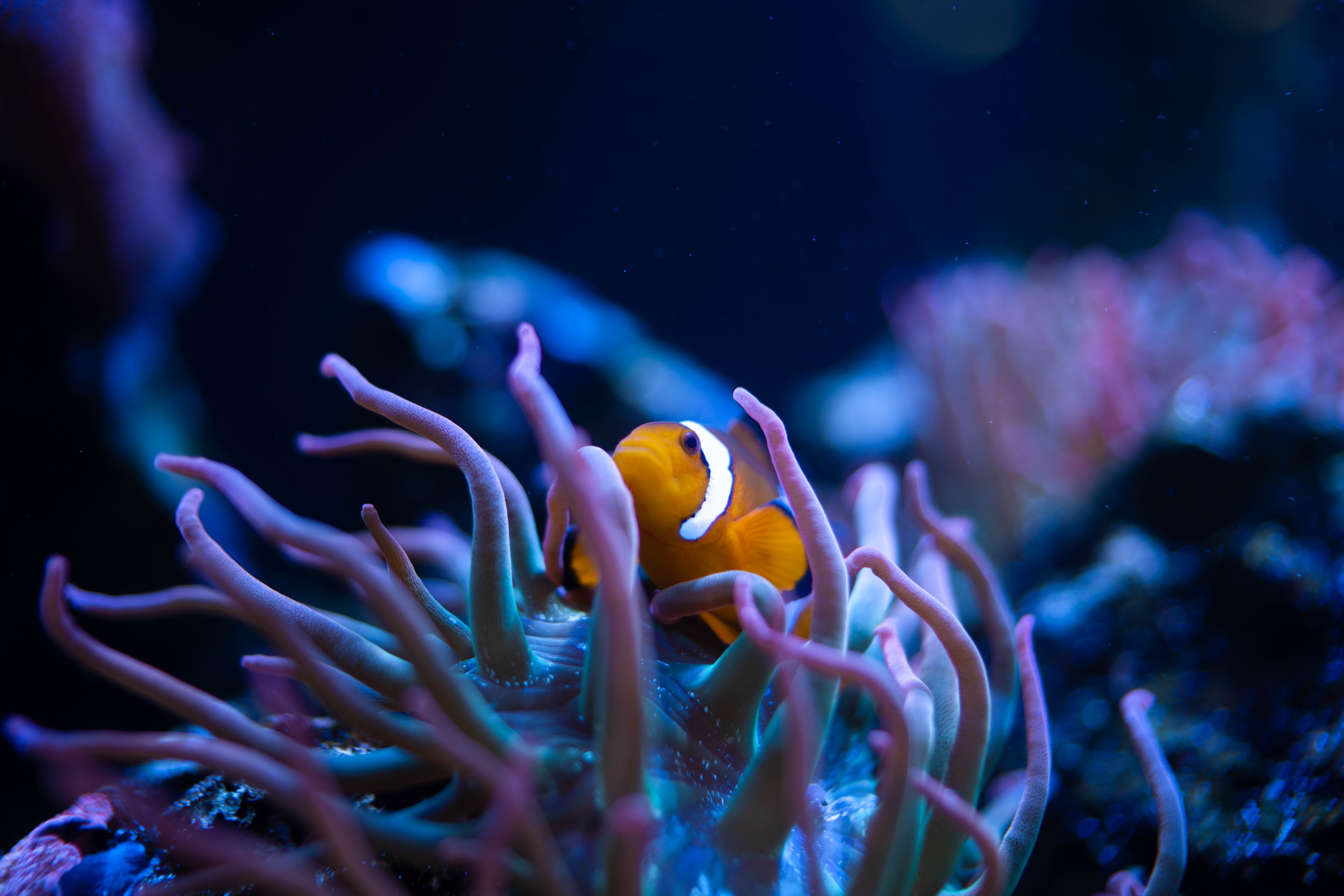Marine Life Cares
 About Marine Life
About Marine Life
Marine Life at West Edmonton Mall (WEM) offers complex and multi-faceted care for our animals. We focus on the most up-to-date and scientifically sound nutrition, housing, enrichment, and veterinary care for each of our species. This way we are able to ensure all of our animals have a high-quality life with us.
WEM participates in the Species Survival Plan (SSP), developed by the Association of Zoos and Aquariums (AZA) to help ensure the survival of marine birds through breeding management. We are also an accredited member of Canada’s Accredited Zoos and Aquariums (CAZA) and the National Marine Educators Association (NMEA).
Why do we have animals?
Zoos and aquariums protect and conserve wildlife; they take in rescued or injured animals from the wild. They also house animals that have been bred under human care that cannot survive in the wild anymore. Marine Life offers a safe and healthy habitat to many rescued animals. Some of them were abandoned pets, while others were illegally smuggled into Canada. All of them now have “forever homes” at Marine Life.
Every animal species has a story that needs to be told, whether it’s critically endangered or an ambassador for its species. WEM’s Marine Life enriches, engages, and reconnects people with nature while inspiring conservation. We reach out to audiences through exhibits and animal programs, bringing information about our animals, their stories, and what can be done to help their species in the wild. Our conservation and education programs encourage respect and responsible management of all living creatures.
Many of the animals at Marine Life participate in conservation efforts to save their species from extinction. We participate in the Species Survival Plan (SSP), which allows us to transfer animals between other accredited zoos and breed them as a failsafe against extinction.
How are they cared for?
We strive to offer our animals top level care, which is carefully recorded so that every interaction is able to be recalled and discussed—keeping continuity intact. We focus on scientifically sound nutrition, housing, enrichment, husbandry and veterinary standards for each species.
Marine Life has a team of veterinarians, animal health technicians, management, and animal care staff dedicated to caring for our animals. Our staff participates in training programs with our animals. This training is not simply for entertainment—animals are taught behaviours that allow us to do in-depth medical checkups, such as x-rays and ultrasounds completely voluntarily!
Health and Diet
Physical examinations occur daily before any animal is used for a presentation or program, and again at the end of the day. Findings from these examinations are recorded, and if any significant issues are discovered, adequate steps are taken to remedy them. Additionally, for many of our animals (such as our sea lions, penguins, and sea turtles), husbandry needs extend much further than simple body check-overs. We brush our sea lions’ teeth, apply medicated ointment to our birds’ feet, and scrub our sea turtles’ shells. Diets are separated and weighed for every individual animal. We ensure their complete nutritional needs are being met and are specific to each animal. Diets are closely monitored and adjusted as animals’ appetites increase, or decrease, due to changing body cycles or seasonal changes.

Environment
Every exhibit at Marine Life is closely monitored for things like temperature, humidity, fecal matter, and overall cleanliness. Our water-based exhibits have multi-layer filtration systems to ensure proper circulation, cleanliness, and water chemistry. All parameters are checked on a daily and weekly basis.
Training
At Marine Life, we train for the proper mental stimulation of our animals. We use a type of positive reinforcement training known as “operant conditioning.” Positive reinforcement may be food, or something else, like an animal’s favourite toy. If the animal doesn’t do what we ask, that is totally fine! We simply move on to something the animal does want to do. We never punish any animal in any way, and we never withhold food. The animal will always get their whole daily diet, even if they do not participate in a show or program that day. Like all training, the key is to make it positive and exciting for the animals. By making it rewarding, the animals choose to participate, and this allows us to take excellent care of them.
Can they be released into the wild?
Our animals, born under human care, have been cared for their entire lives. They have never been “wild” and wouldn’t know how to survive if set free in their natural environment. The animals that live at Marine life have either come from rescue centers, private donations or were actively bred in other zoos or aquariums. Consequently, these animals have formed bonds (human imprinting) with their caretakers, making their chances of survival in the wild unlikely.
There are several reasons for this:
- Animals under human care have regulated diets, provided for them by their keepers. The introduction of new pathogens or bacteria into their bodies would be harmful. They simply have not built-up their immunity the way wild populations have.
- Our animals have never encountered predators. They have developed a natural curiosity toward new stimuli that will cause slowed reaction to dangerous situations.
- Our animals have regular, monitored contact with humans. Release into the wild would likely result in them seeking humans to interact with, which could endanger them.
- Some of our animals from rescue situations have ongoing medical issues, to release them without that care could be fatal.
- Open ocean sanctuaries would also have these sea lions introduced to bacteria and parasites they have never encountered and therefore stand a better chance of becoming ill as they have not built up any resistance
How can I help protect animals?
Most people don’t realize that they can help in their everyday life simply by following the three Rs, Reduce, Reuse, and Recycle. If we think about how many things we could reduce, reuse or recycle in a day we can make a major difference, pack your lunch into a reusable tupperware container, request no plastic straw in your drinks from restaurants, recycle your cans, bottles, and boxes.
Help protect African Penguins and make a donation at Marine Life. 100% of donations go to The Southern African Foundation for the Conservation of Coastal Birds (SANCCOB).
